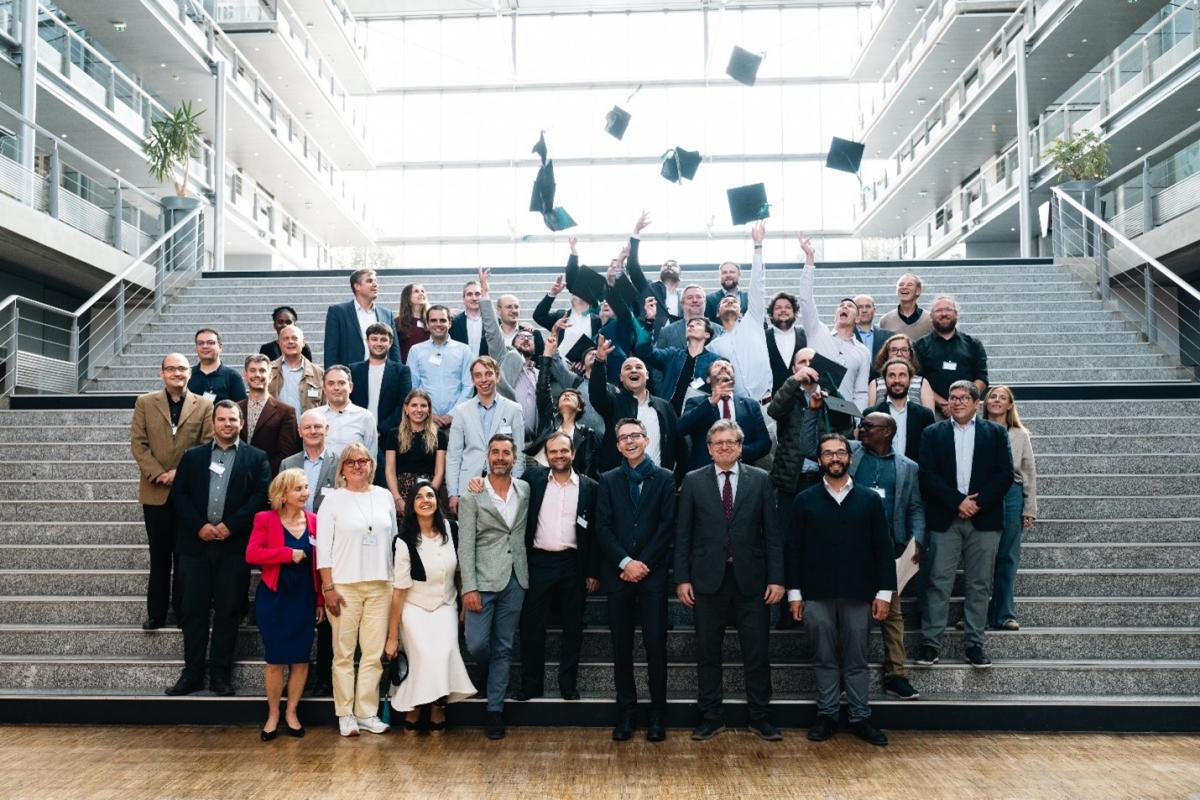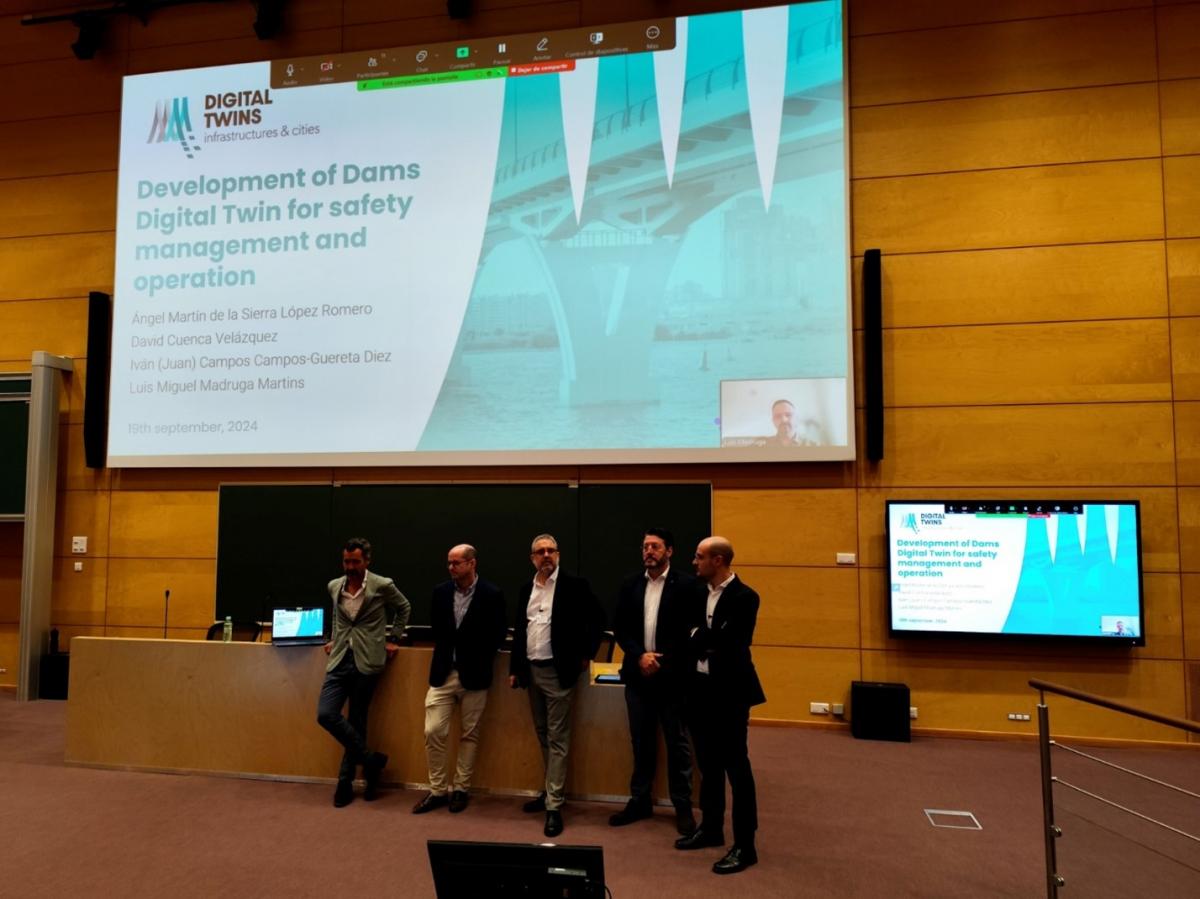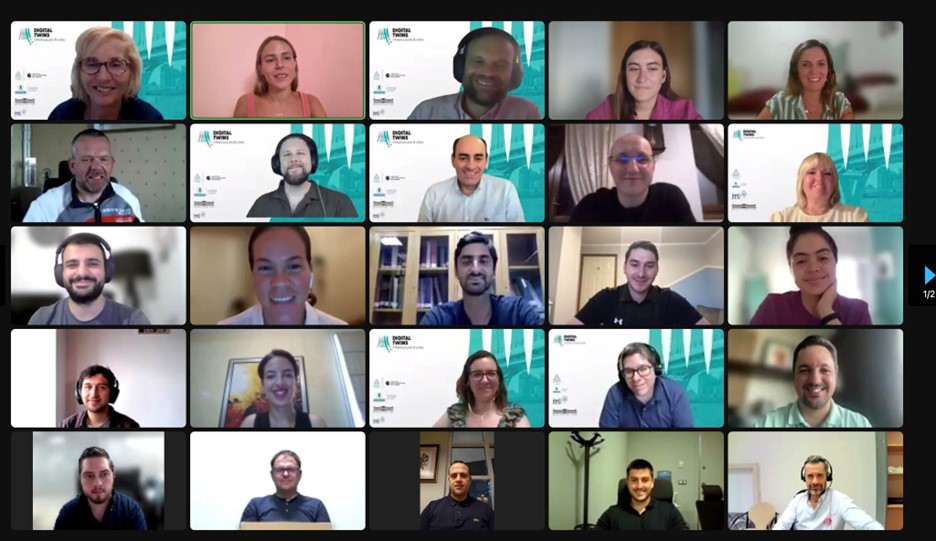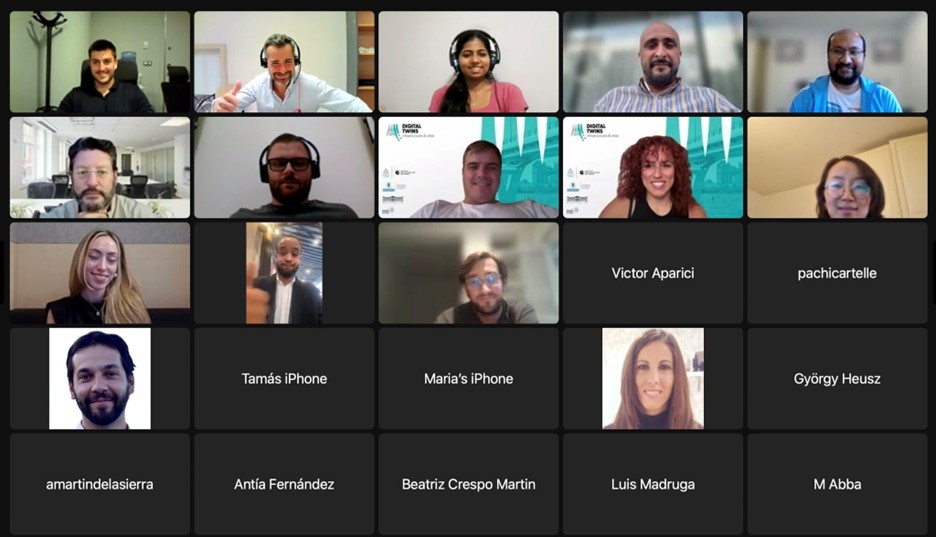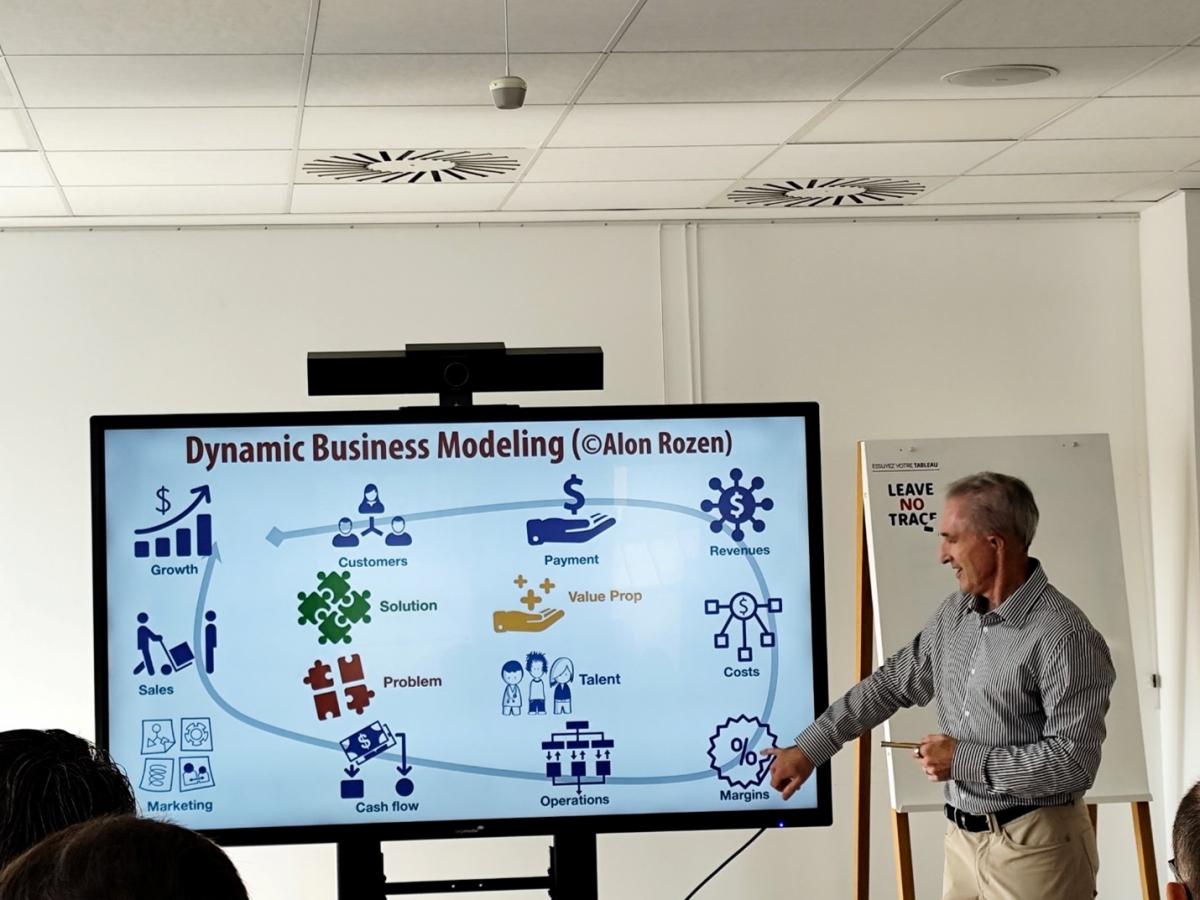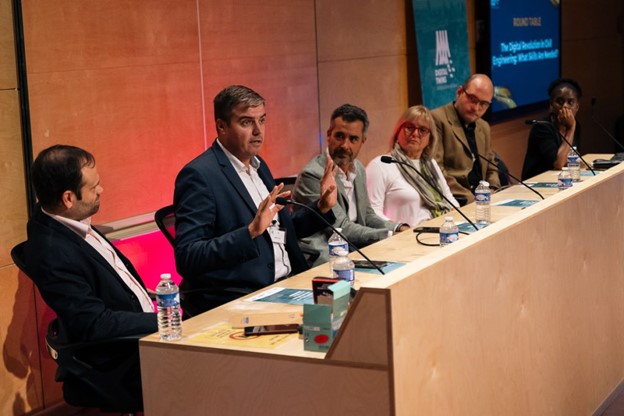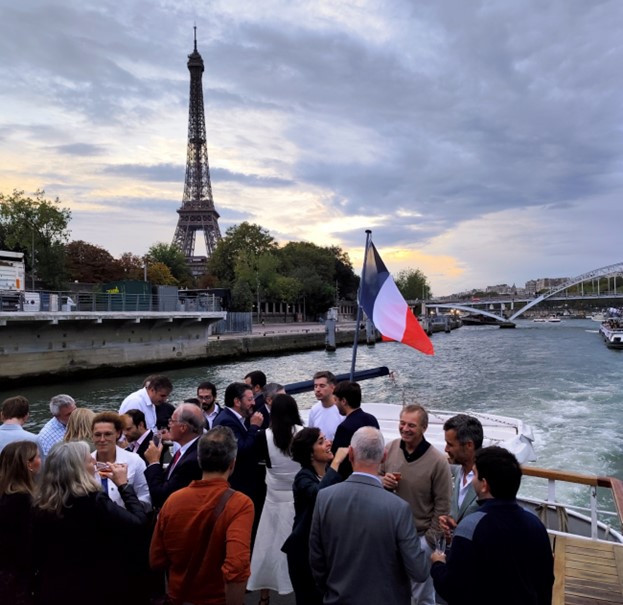Capstone Project Presentations and Graduation Ceremony
The Digitwin4CIEU project is an initiative under the European Union's Digital Europe Programme, which aims to accelerate the digital transformation of society and the economy across Europe. At its core, the project focuses on advancing digital skills and integrating cutting-edge technologies within the civil engineering and construction sectors. One of the key components of this initiative is the Executive Master in Digital Twins for Infrastructures & Cities, a unique joint degree program offered by prestigious European institutions, including Universidad Politécnica de Madrid, École des Ponts ParisTech, Budapest University of Technology and Economics (BME), and Istanbul Technical University. (ITU is expected to obtain its formal accreditation to the joint degree in 2025.) Supported by the EELISA alliance, this program blends online learning with in-person events hosted in Madrid, Paris, and Budapest. It is designed to train future leaders in the civil engineering and construction industries by providing them with hands-on experience in the use of digital twins for infrastructure management, equipping graduates with the skills to lead the digital and green transformation in their fields. Through this collaborative and innovative approach, the program not only fosters academic excellence but also bridges the gap between industry and academia, ensuring a sustainable future for the construction sector.
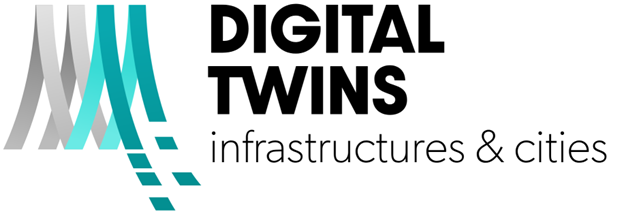
On September 19th and 20th, École des Ponts ParisTech in Paris hosted the capstone project presentations and the Graduation Ceremony for the inaugural cohort of the Digital Twins Executive Master. This two-day event marked the culmination of an intensive year for the 19 students who pioneered the program.
1 – Graduating inaugural cohort at the onsite event in Paris
Over these two days, the students presented six capstone projects, showcasing the fruits of their hard work and collaboration with mentors, professors, and industrial partners. While some participants could not attend in person due to unforeseen circumstances, the thesis defenses were live-streamed, ensuring that all students, including the incoming cohort, could witness the presentations.
-
Optimization of Scan2BIM Applied to the French Railway Infrastructure
Participants: Víctor Aparici Godoy, Fouad Harrag, Beatriz Crespo Martín, György Heusz
Mentors: Livaï Quintard, Anis Chaarana (Altametris)
Coordinator: Nicolas Audebert (École des Ponts ParisTech)
-
Reliability of Asset Data through Remote Multi-Source Measurements
Participants: Juan Manuel Aguado López, Borja Bergara, Salihcan Karaman, András Nagy
Mentors: Maxime Gueguin, Daniel Chauveheid (Eurobios Mews Labs)
Coordinator: Loïc Landrieu (École nationale des ponts et chaussées)
-
A Simulation of Wind Turbine Sensors Based on Real Data
Participants: Abba Mohammed Abubakar, Edmore Hamandishe
Mentor és Coordinator: Samy Z. (Siemens Gamesa)
-
Development of Dams - Digital Twin for safety management and operation
Participants: Luis Madruga, Iván Campos-Guereta Díez, Ángel Martín de la Sierra López Romero, David Cuenca-Velázquez
Mentors: Fidel San Emeterio, Carlos Rodríguez, Luis Castillo Cano-Cortés (Ayesa)
Coordinators: Miguel Ángel Toledo Municio, Eduardo Salete (Universidad Politécnica de Madrid)
-
Digital Twin of a Bike Sharing Service: Optimising Operations through Artificial Intelligence
Participants: Alberto Navas, Iván Revilla Hernández
Mentors: Javier Burrieza Galán, Oliva Garcia Cantu Ros (Nommon)
Coordinators: Natalia Sobrino Vázquez (UPM), Juan Benavente Ponce (Universidad de Cantabria)
-
Developing a Predictive Model of Mass Events
Participants: Antía Fernández, Pachi Cartelle
Mentors: Javier Burrieza (Nommon), Rodrigo Vázquez (INECO)
Coordinator: Javier Vaca (CaminosUPM)
Mentoring Companies: Nommon and INECO
2 – Before the capstone defense, including team members online who could not attend onsite
Despite the challenges of a long academic year, the coordinators, faculty, and industry partners worked closely with the students, guiding them to this significant achievement. With almost 30 new students now starting their own journey in the second cohort, the inaugural cohort’s capstone defenses provided valuable insights into what lies ahead.
3 – Second cohort’s online opening session, where they could virtually meet the inaugural cohort and the coordinators
The event kicked off with a workshop led by Alon Rozen, setting the stage for the capstone presentations.
4 – Alon Rozen presenting during his workshop
Before the graduation ceremony, a distinguished roundtable event was held to discuss the key aspects of the Digitwin4CIEU project. The roundtable featured respected experts from each participating institute and was moderated by
Sofía D’Aguiar (Executive Director of the EELISA European University Alliance). The panel included six notable speakers:
Fernando García Molina (Coordinator of DIGITWINS4CIUE project, UPM),
Isabel Rosa (Responsable Financement de la Recherche et Dévelopement at Altametris),
Cristian Dumitru Tranca (Vice dean at
UPB),
Mathieu Arquier (Director of the Digital Twins for Infrastructures and Cities Executive Master, ENPC),
Tamás Lovas (Associate Professor at
BME), and
Birgul Çolakoglu (Coordinator of MArch Program at
ITÜ). Each speaker provided valuable insights into the challenges and opportunities within the field, further enhancing the collaborative spirit of the Digital Twins program assuring the graduating students the doors to each institute and upcoming event of the program is open for them.
As part of this collaborative effort, the Centre of Excellence (CoE) for Digital Twins in Civil Infrastructures and Cities is being established, with BME playing an active role. The CoE will be built upon four key pillars: innovative research, knowledge-sharing, industry collaboration, and start-up development. These pillars aim to drive the adoption of digital technologies, enhance sustainability, and improve productivity in the construction sector across Europe, ensuring continuous progress and innovation in the field.
5 – Roundtable at ENPC
After the evaluations were completed, the event transitioned into the graduation ceremony. Students received temporary certificates, validating their accomplishments as they await their official joint degree, supported by the EELISA program. This degree will be signed by the rectors of École des Ponts ParisTech, Universidad Politécnica de Madrid, and BME.
6 – Graduating from the inaugural cohort, Antía Fernández, who finished with the best score
The celebration concluded with a Gala dinner cruise on the Seine, symbolizing the end of one journey and the beginning of new opportunities. We extend heartfelt congratulations to the brave first cohort, who embarked on this path with vision and resilience. They are now permanent members of our alumni network. As we welcome the next cohort, we encourage the exchange of ideas, industry challenges, and networking opportunities to support their future endeavors.
7 – Gala dinner cruise on the Seine
The journey of digital twins continues to grow, and we look forward to seeing both cohorts excel and contribute to this transformative field!

